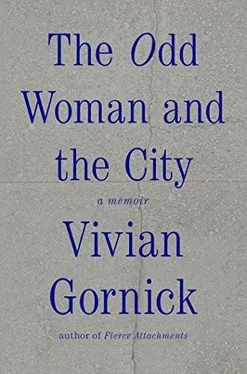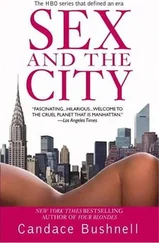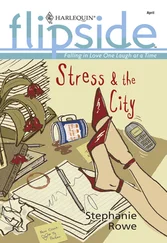took out one that had begun to rot
and put in a good one instead.
“He came back at Christmas,” he added.
“How wonderful! That was wonderful!”
“Yes,” he said gently, “it was wonderful.”
He took the bag of apples from my hands again
and took out one of the smaller apples and put in a large one.
I often wonder what Reznikoff’s poems would sound like were he walking the streets today.
* * *
“Every man alone is sincere,” said Ralph Waldo Emerson. “At the entrance of a second person, hypocrisy begins … A friend, therefore, is a sort of paradox in nature.”
* * *
I had an affair with a downtown playwright. Two things about this man: He was an ex-alcoholic, and he was phobic about leaving the city. I was too old to think him poetic, but I did. He promised to remain sober, and he kept that promise. He promised to be faithful, but he didn’t keep that one. After he left me I suffered, in equal part, heartbreak and outrage. “You’re leaving me ?” I wailed. “I’m supposed to leave you !”
An alcoholic, Leonard shrugged.
An ex-alcoholic, I explained.
I don’t care what kind of alcoholic, Leonard said.
Now, we’re walking up Sixth Avenue in midtown and suddenly — I don’t know why, maybe I’m remembering the playwright — I recall a wonderful line of Frank O’Hara’s that I saw threaded in letters of steel along the marina balustrade in Battery Park City. “One need never leave the confines of New York to get all the greenery one wishes,” O’Hara had written. “I can’t even enjoy a blade of grass unless I know there’s a subway handy, or a record store or some other sign that people don’t totally regret life.” I repeat the line to Leonard, whose eyes crinkle up with pleasure. “An overpraised poet,” he says, “but sometimes he was really quite marvelous.”
“Yes,” I say, nodding. I can feel O’Hara’s sentence repeating itself in my head, and I’m starting to yearn toward it.
“It’s a pity,” Leonard says, “that—”
“He died so young,” I break in. Leonard stares at me.
“His only bi-og-raphy was so shal-low…”
“Oh!”
“ Hon -estly.” He peers at me. “Can’t have a serious conversation with you anymore.”
“Okay, okay.” I pull myself together. “Yes, he does deserve a good biography.”
“Not so much for himself,” Leonard says. “He was a mad bad boy all his life, who knows what the work would have come to, but his life was a sign of the times. It was one of those moments [the fifties] when aesthetics replaced politics, and you know gays are always welcome then. It was the end of the war, New York was at its loveliest, a few men were feeling bold enough, and unafraid enough, to be themselves openly. If you had a sense of privilege, as O’Hara did, you could push the thing to unheard-of limits. Which he did. And because he did, because he was so astonishingly bold and got away with it , things began to change.”
As we’re passing Radio City Music Hall, Leonard looks up at the garish old movie palace. “You had to have beauty and class and Ivy League self-confidence,” he says, “all of which O’Hara had. It would have been unthinkable for someone like me to try it.”
With these words he falls into a reverie whose rue is palpable.
I nudge him. “But if O’Hara hadn’t lived it out then, you would not be walking here with me now.” I laugh. “Even I would not be walking here with me now.”
He joins me in the laugh: grudgingly. He hates giving up his grievances. He equates them with the irony he says saved his life. That he will never give up.
In the evening we have dinner at the home of a pair of psychoanalysts we both know only slightly. The people at the table are homophobic, worshipful of “values,” and avid to talk culture. The dinner is expensive, but the conversation is junk food. The analysts address themselves exclusively to me. I feel trapped. Repeatedly, I turn to Leonard to enjoy myself, but I am alone at the table. He has withdrawn into a remoteness I cannot penetrate. Later we walk through the dark and silent streets. The night is cold. We burrow into ourselves. After a time Leonard says to me, “I don’t interest them. And the part of me that’s interesting frightens them.”
We do not draw closer because of what he has just said — I’ve been alone in his presence too many hours now — but life feels easier to bear for the clarity his words have imposed on an otherwise pointless evening.
My friendship with Leonard began with me invoking the laws of love: the ones that involve expectancy. “We are one,” I decided shortly after we met. “You are me, I am you, it is our obligation to save each other.” It took years for me to realize this sentiment was off the mark. What we are, in fact, is a pair of solitary travelers slogging through the country of our lives, meeting up from time to time at the outer limit to give each other border reports.
* * *
The front door of my building is just a few steps from a subway entrance. Between the two a man stands, begging. He’s been standing here almost every day now for more than two years. His name is Arthur. He is black, in his thirties, handsome, neatly dressed. He holds a paper cup in his hand and in a warm, patient voice intones over and over again, “Ladies and gentlemen, I wonder if you can help me out. I don’ have anywhere to sleep, and I’d sure like a little food in my stomach. I don’ drink, take drugs, or do any criminal activities. All I’m askin’ for is your support in these hard times. Anything you can spare will be appreciated.”
I hardly ever give Arthur money — as a child of the Left I remain categorically opposed to begging — but I talk to anyone who talks to me. Arthur and I chat every morning. (How ya doin’? Okay, and you? Not bad, not bad. Don’t stay out too long, it’s gonna be cold today.) Sometimes if I’m in a hurry, all I do is wave hello. Invariably, he’ll then rag me. “Lookin’ good ta-day,” he’ll call out, “real good.” I’ll start to laugh and his voice will follow me, continuing to call out in that tender, baiting way he has.
The other day a man came up out of the subway just as I was walking through my front door. Arthur held out his cup. The man jerked his body away from Arthur’s hand as though from something diseased, on his face a look of murderous disgust. Arthur went on droning as though nothing out of the way had occurred, but I felt ill. “What is this all about ?” I cried. “Are you going to do this for the rest of your life ?”
His laughing eyes looked down at me. I was a mark like any other. “Ma’am,” he said, and went into his routine, “I look for a job, the Man he don’ wanna help me, he does everything he can to keep me down, he don’ care if I starve in the street.”
Arthur is smart and he has words, but so do I. I stood there arguing with him. Then, in the middle of a sentence, he said sharply, “I’ll decide when the vacation is over.”
I stared at him. I don’t know what he saw in my face, but his own softened perceptibly. Very quietly he said, “It doesn’t mean what it meant when you were young.”
* * *
Once, in the late seventies, when I was on my high horse for radical feminism, I was invited to give the commencement address at a small women’s college. I called my mother to let her know that this honor had been bestowed on me.
“You were asked to deliver a commencement address?” she exclaimed incredulously.
“Yes,” I said.
“You mean someone writes the speech and you give it?”
“No,” I said, “I write the speech and I give it.”
Читать дальше












